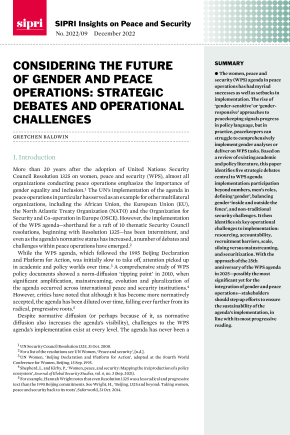Considering the Future of Gender and Peace Operations: Strategic Debates and Operational Challenges
The women, peace and security (WPS) agenda in peace operations has had myriad successes as well as setbacks in implementation. The rise of ‘gender-sensitive’ or ‘gender-responsive’ approaches to peacekeeping signals progress in policy language, but in practice peacekeepers can struggle to comprehensively implement gender analyses or deliver on WPS tasks. Based on a review of existing academic and policy literature, this paper identifies five strategic debates central to WPS agenda implementation: participation beyond numbers, men’s roles, defining ‘gender’, balancing gender ‘inside and outside the fence’, and non-traditional security challenges. It then identifies six key operational challenges to implementation: resourcing, accountability, recruitment barriers, scale, siloing versus mainstreaming, and securitization. With the approach of the 25th anniversary of the WPS agenda in 2025—possibly the most significant yet for the integration of gender and peace operations—stakeholders should step up efforts to ensure the sustainability of the agenda’s implementation in line with its most progressive reading.
I. Introduction
II. Strategic debates in gender and peace operations
III. Operational challenges stemming from strategic debates
IV. Conclusions

